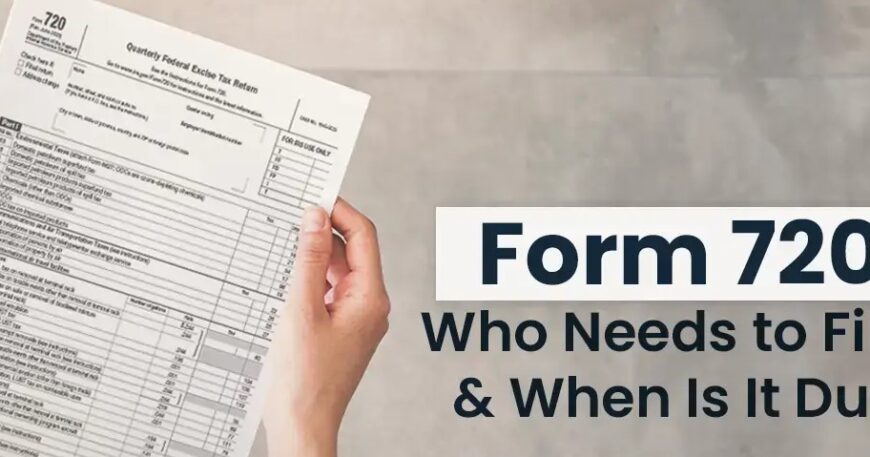Tax season can be complex, and navigating excise taxes can be particularly challenging. However, businesses that sell goods or services subject to excise taxes must file Form 720, Quarterly Federal Excise Tax Return. This guide by Syed Professional Service clarifies everything you need to know about Form 720, empowering you to report and pay excise taxes confidently.
Understanding Excise Taxes and Form 720
Excise taxes are levied on specific goods or services, often included in the final price paid by the consumer. Examples include taxes on gasoline, air travel, phone calls, and certain types of equipment. Businesses responsible for collecting these taxes must report and pay them to the IRS via Form 720.
Who Needs to File Form 720?
Your business is required to file Form 720 if you meet any of the following criteria:
- Collected Excise Taxes: If your business collected any excise taxes from customers during the quarter, you must file Form 720, even if the total amount collected is minimal.
- Responsible for Excise Taxes: In some instances, even if you didn’t directly collect excise taxes, you might still be responsible for reporting and paying them. Consult the IRS guidelines for specific details.
- Final Excise Tax Return: If your business is closing or no longer selling products subject to excise taxes, you might need to file a final Form.
Understanding the Filing Requirements of Form 720
Form 720 is a quarterly filing, with deadlines at the end of April, July, October, and January for the previous quarter’s tax activity. Here’s a breakdown of some key filing aspects:
- Electronic Filing: The IRS mandates electronic filing of this Form for most businesses. You can utilize the IRS website or authorized tax software providers for electronic submission.
- Tax Payments: Excise tax payments are typically required semi-monthly, not quarterly. Ensure you make timely payments using the Electronic Federal Tax Payment System (EFTPS) to avoid penalties and interest.
- Recordkeeping: Maintain detailed records of your excise tax collections throughout the year, including invoices, receipts, and relevant documentation. The IRS might request this information to verify your tax filings.
Completing Form 720: A Breakdown of Key Sections
While Form 720 might seem complex initially, understanding its sections simplifies the process. Here’s a breakdown of the critical parts:
- Part I – IRS Information: This section gathers basic information about your business, including the employer identification number (EIN).
- Schedule A – Tax on Certain Specified Use Fuels: Report any excise taxes collected on gasoline, diesel, and aviation fuel.
- Schedule C – Claims: This section applies if you overpaid excise taxes in a previous quarter and claim a credit or refund.
- Payment Voucher: This detachable voucher is the payment slip for the excise taxes you owe for the quarter, referencing the EFTPS payment method.
Beyond Form 720: Maximizing Tax Compliance
While Form 720 plays a central role, here are some additional considerations for managing excise taxes effectively:
- Understanding Excise Tax Rates: The IRS website provides a comprehensive list of taxable goods and services and their corresponding excise tax rates. Familiarize yourself with these rates to ensure accurate tax collection and reporting.
- Exempt Sales: Not all sales are subject to excise taxes. The IRS guidelines outline exemptions for specific situations and products. Understanding these exemptions can help you avoid unnecessary tax collection and reporting burdens.
- Staying Informed: Excise tax regulations can change periodically. Staying informed about updates and revisions through the IRS website ensures ongoing compliance.
Syed Professional Service: Your Partner in Excise Tax Management
Navigating excise taxes and Form 720 can be a collaborative endeavor. Syed Professional Service can be your trusted partner throughout this process:
- Excise Tax Expertise:. Our tax professionals deeply understand excise tax regulations and can guide you on which products and services are subject to these taxes.
- Form 720 Completion Assistance:. We can help you complete this Form accurately, ensuring all necessary information and calculations are presented correctly.
- Timely Tax Payments:. We can help you meet excise tax deadlines and guide you through the electronic payment process via EFTPS.
- Tax Compliance Strategies:. Beyond excise taxes, we offer comprehensive tax services to ensure your business complies with all relevant tax regulations.
Achieving Tax Compliance with Confidence




